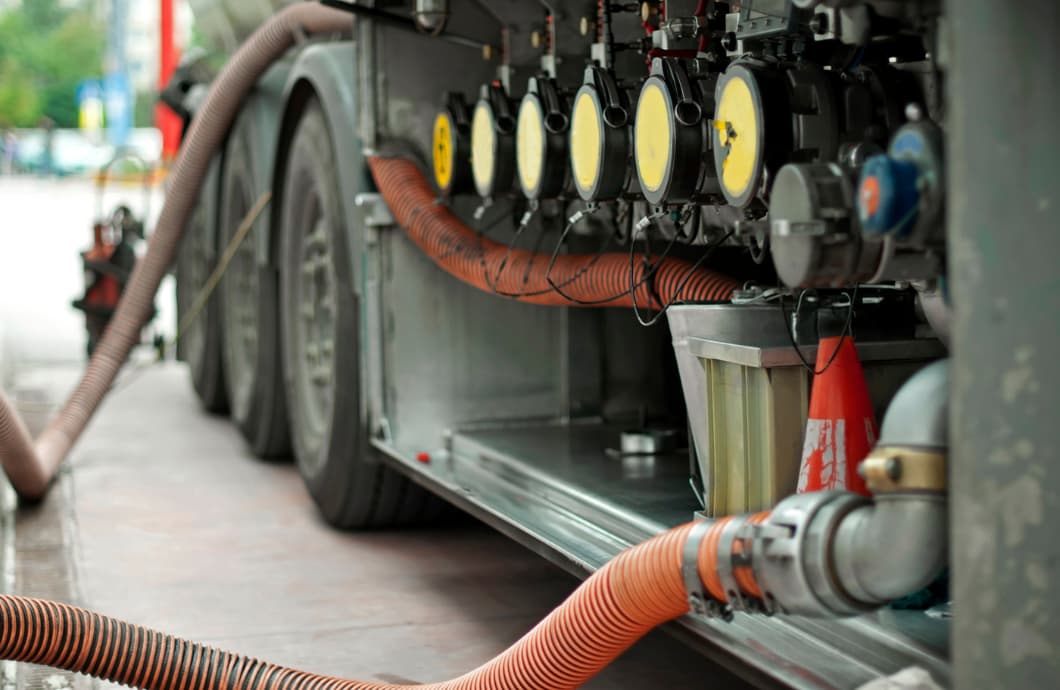
Venturing into the World of Fuel Hauling
"What is it like to be a fuel hauler?"
For truck drivers contemplating a career shift, fuel transport presents a unique and rewarding opportunity. This sector, distinct from general freight hauling, involves specific skills and knowledge.
This guide is all about fuel hauler advice for those considering making a shift in their trucking career.
We consulted the advice of experienced fuel hauler truck drivers as well as industry insights to provide you with this comprehensive overview about what it takes to thrive in the fuel hauling commercial driving niche.
Understanding Fuel Hauling: More Than Just Driving
Fuel hauling is not just about delivering fuel on time; it's about handling hazardous materials with care and precision.
"You're not just a driver; you're a custodian of safety. It's crucial to always be alert, especially when loading and unloading. Mistakes can be costly—not just financially, but also in terms of safety."- experienced fuel hauler
Industry Insights: Why Choose Fuel Hauling?
Fuel hauling offers several advantages over traditional freight jobs.
According to a seasoned driver, "It's one of the better local gigs. You can expect good pay, and it's local work, meaning you're home more often. Plus, it's a 24/7 industry—offering flexibility in schedules."
This glowing review should also be tempered with the pros and cons of fuel hauling—the main potential con being night driving. Because it's more convenient for fuel haulers to unload during gas station off hours, a big part of fuel transport includes a lot of night driving. While day drivers expressed their dislike of the tendency of new fuel haulers to have to work many night shifts for a while until they earned seniority, other drivers enjoyed the lack of traffic in the early morning hours.
Another perk of fuel hauling is the pay structure, as we heard from one driver:
"In fuel hauling, you're often paid by the hour, which can be more predictable and less stressful than being paid by the mile."
Navigating Challenges: Tips from Experienced Drivers

Experienced haulers emphasize the importance of mastering specific skills.
- "Learn how to manage sloshing in your tanker, especially when it's not full. Also, adapt your driving style—avoid downshifting through all gears when slowing down to minimize sloshing."
- "Start in LO gear and use your splitters effectively. These techniques might differ from what you learned in driving school, but they're essential for tanker hauling."
There are many other subtle yet important differences to consider when hauling hazardous liquids, making it essential that you brush up on official driver education resources.
The Learning Curve: Adapting to Fuel Hauling
Transitioning to fuel hauling can be challenging. However, according to many fuel-hauling truck drivers, this kind of driving becomes more manageable over time with more experience.
"The first six months are critical. It's a lot to learn, but once you get the hang of it, everything becomes like clockwork," says a driver who made the shift.
Emphasizing routine and attention to detail is also crucial, as this fuel hauler also added, "Have a routine for everything and double-check your connections before letting the product flow. Complacency is the biggest danger for experienced drivers."
Career Growth and Opportunities

Fuel hauling is not just a job; it's a career with growth potential.
"I've been doing fuel for about 5 years, and it's been rewarding. There are opportunities to learn, grow, and even shift schedules based on seniority or preference," shares a driver.
"How does the pay compare for fuel hauling compared to other forms of truck driving?"
When it comes to compensation, fuel haulers often find themselves in a more advantageous position compared to other truck driving roles. Industry data suggests that fuel haulers typically earn higher wages, largely due to the specialized nature of their work and the additional safety responsibilities they bear.
"As a fuel hauler, I've noticed our pay rates are generally higher. This is due to the hazardous nature of the cargo and the level of precision required in our job," explains a seasoned fuel hauler.
Another driver elaborates, "In addition to competitive hourly rates, many of us also receive overtime pay, which significantly boosts our earnings."
This difference in pay reflects the specialized skills and heightened safety protocols necessary for transporting hazardous materials.
Furthermore, the 24/7 nature of the industry often leads to more consistent work opportunities—even during typically slow periods for other trucking sectors. The combination of higher hourly wages, the potential for overtime, and steady work makes fuel hauling an attractive career choice for drivers seeking both financial stability and a challenging work environment.
Additionally, the industry often offers benefits like 401k plans and health insurance—making it a stable and secure career choice.
Considering Fuel Hauling as a Career Choice
"This sounds great! What should I do to become a fuel hauler?"
For truck drivers considering a transition to fuel hauling, the first step is to gain a firm grasp of the industry's requirements.
Obtaining CDL Endorsements for Fuel Hauling: HazMat and Tanker
To become a fuel hauler, obtaining specific endorsements on your Commercial Driver's License (CDL) is essential. The Hazardous Materials (HazMat) and Tanker endorsements are critical for this career path. Here’s a step-by-step guide to acquiring these endorsements:
-
Review State-Specific Requirements: CDL endorsements are regulated by individual states, so the first step is to check with your state's Department of Motor Vehicles (DMV) or equivalent agency. They provide specific requirements and procedures.
-
HazMat Endorsement (H):
- Background Check and Fingerprinting: Since you'll be transporting hazardous materials, a background check by the Transportation Security Administration (TSA) is mandatory. This process includes fingerprinting.
- Knowledge Test: Prepare for and pass a written knowledge test focused on handling hazardous materials. Study materials can typically be found on your state's DMV website or through commercial driving schools.
- Application Process: Complete the HazMat endorsement application through your state's licensing agency. This will include the TSA background check results and the knowledge test scores.
-
Tanker Endorsement (N):
- Knowledge Test: Similar to the HazMat endorsement, you’ll need to pass a knowledge test specifically for transporting liquids in bulk. This test covers the unique aspects of operating a tanker vehicle, including handling surge, braking, and turning.
- No Additional Background Check Required: Unlike the HazMat endorsement, the tanker endorsement doesn't require a background check.
-
Training and Preparation: While not always mandatory, enrolling in a training course can be highly beneficial. These courses cover the specifics of hazardous material transportation and tanker operations, helping you to pass the knowledge tests and be better prepared for the job.
-
Application and Fees: After passing the tests, complete the endorsement application process and pay the required fees. These fees vary by state.
-
Renewal and Recertification: Be aware that these endorsements require periodic renewal and, in the case of HazMat, a recurrent background check. Keep track of the expiration dates and renewal requirements.
-
Continuous Learning: Stay updated on federal and state regulations regarding hazardous materials transportation, as these can change over time.
By following these steps and successfully obtaining your HazMat and Tanker endorsements, you'll be well on your way to starting a career in fuel hauling.
Let's review some info we've covered as well as look at some additionally helpful steps.
- Safety and compliance are paramount in this industry, so ongoing education and adherence to regulations are key to a successful career.
- Researching and connecting with companies that specialize in fuel hauling can provide valuable insights into the specific needs and expectations of the sector.
- Networking with experienced fuel haulers and participating in relevant online forums or local trucking communities can also offer practical advice and insider knowledge.
- It's important to understand the safety protocols and operational nuances specific to fuel hauling—which might include specialized training programs offered by potential employers.
- As a proactive step, consider enhancing your driving skills to suit the unique challenges of handling a tanker, such as maneuvering in tight spaces and managing liquid cargo dynamics.
- Finally, approach the transition with a mindset focused on safety and attention to detail, as these are the cornerstones of success in the fuel hauling industry.
Taking these steps will not only prepare you for a career in fuel hauling but also position you as a competent and reliable candidate in this specialized field.
Gear Up with My Little Salesman
For all of your commercial trucking needs, you can find them from a seller through My Little Salesman. Since 1958, My Little Salesman has been connecting buyers to sellers to help them find the best deals on highest quality commercial equipment, trucks, parts, and accessories all over North America.